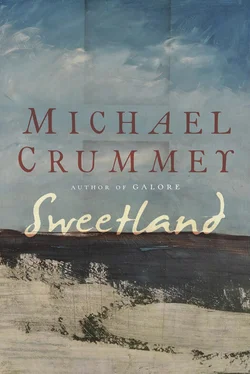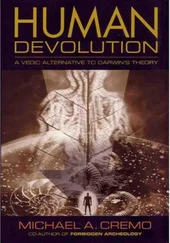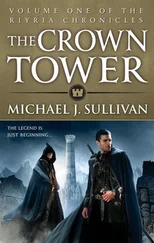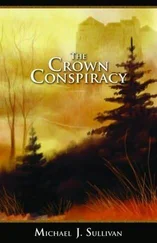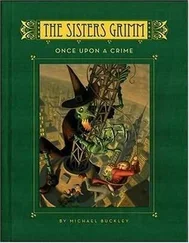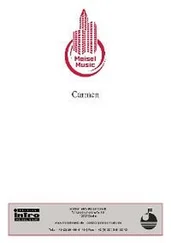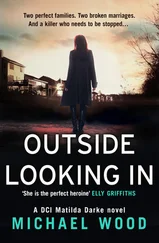“And where the fuck were you?” Sweetland shouted. Relieved to see the animal.
He’d caught sight of the cabin’s peak at the head of the valley, but it disappeared again as he moved down into the trees. He was at the door before he knew he was close. There was a drift of snow across the front of the building and he kicked it clear, stepped inside behind the dog. The cabin backed right into the eastern ridge and out of the wind. Sweetland shut the door behind him and listened to the silence. Except for the occasional rattle in the chimney, there was nothing to say a storm was on. He looked down at the dog, its breath coming in plumes. It was colder inside than out, a chill the room had been storing up for months.
The brothers spent no time at the cabin over the winter and the woodbox by the stove was nearly empty. A bit of kindling, a pile of sawed-up two-by-four scavenged from the remains of the deck at the keeper’s house. A Bic lighter beside the flue. Sweetland set about making a fire, leaving the stove door open an inch to let the draft take up through the dry kindling. Looked around the room as he waited for the heat. The cabin was a storey and a half, with bunks in a loft built under the eaves. A window over the sink against one wall. A square table beneath the loft, a loveseat the brothers had sawed in half to make it easier carrying out from the cove. It was stuck together with nails and duct tape, a predominant slump across the middle. There was a poster-sized outline of Newfoundland tacked on the opposite side of the room. It was a commemorative map produced in 1966, Come Home Year in a faux-antique script across the top.
Hardly the cornucopia of delights he’d been dreaming about. Sweetland was familiar enough with the cabin that none of it was a surprise. It was hard to believe he’d made so much of it in his mind, lying alone at three and four in the morning.
When it was warm enough inside to take off his coat, he poked through the cupboards over the sink. Two plates, two bowls, a mismatch of glasses and mugs. A plastic baggie of Tetley, a tin of Maxwell House instant. An unopened kilo of sugar, one of the few things he had plenty of. Half a dozen boxes of Kraft Dinner, three Styrofoam containers of Cup-a-Soup. A half-empty jar of peanuts, a flask of vodka. A pack of rolling papers. One lonely tin of Flakes of Ham. Sweetland dug through the cutlery drawer for a can opener and he set half the gelatinous meat on a plate for the dog. He ate the rest of it from the tin, savouring every salty mouthful. Thinking it was enough on its own to have made the trip worthwhile.
He carried the kettle outside and filled it with fresh snow, set it on the stovetop where it spat and hissed. Then he walked to the lean- to built against the waterside wall of the cabin where they kept the generator. Hoping for more firewood, hoping for several gallons of gasoline. The room was padlocked shut and Sweetland took the screws off the lockset in the door jamb, pushed the door as wide as it would go. The generator sitting in shadows at the back of the narrow space, one gas can beside it. Sweetland reached to touch it with his boot and the container shifted where it sat. Not half full. Enough to get the quad back to the cove, and a trip to the lighthouse from there if he ever needed it. But no more than that.
There was nothing else of any use to him. A couple of paint cans, a stack of roofing shingles. A shovel with a broken handle. A coffee can full of roofing nails, screws, a dozen cigarette butts. Sweetland picked through the can to collect the butts and he took them back inside the cabin. He brought in more snow to add to the meltwater in the kettle and then he sat at the table with the flask of vodka, poured himself a shot in a coffee cup. He’d never cared much for vodka and he let it sit there while he straightened the smashed butts and scraped the tobacco from the paper tubes onto the tabletop. There was enough to roll three cigarettes with the papers in the cupboard. He tore strips of the thin cardboard from the cover and rolled them tight to make a crude filter for each one.
“Now, Mr. Fox,” he said. The dog was curled on the loveseat and lifted its head to look at him. “Who’s got it better than this?”
There were moments, he had to admit, when he sounded slightly unhinged. He’d had plenty of quiet time since missing his chance to escape with the Coast Guard to consider whether he was losing his grip on reality and he found it hard to argue otherwise. But he couldn’t make himself believe it. And he was surprised to find he was more or less content with his predicament now, with his place on the abandoned island with Loveless’s little dog and Jesse’s grave. He held to what he’d chosen and managed to make a sort of peace with the bizarre incidents that had become a feature of his days, accepted the fact that some of the world he lived in couldn’t be found on a map. A crazy person wouldn’t be capable of separating the strangeness from the rest of his life, he thought, of settling in the midst of it. But he allowed it was possible that all crazy people thought that way.
He lit one of the hand-rolled and took a slow drag on the butt. His first taste of a cigarette in twenty-five years and he held the stale smoke in his lungs a long time.
Halfway through the flask of vodka he was feeling sick to his stomach. The foul alcohol or the shot of nicotine, or a combination of the two. He was drunk enough to push on, regardless, poured the cup full and lit the second of his three smokes. His head buzzing like a neon light. He’d almost forgotten how much he loved the cigarettes, what a poisonous comfort they were.
The one night the Sri Lankan refugees stayed in Chance Cove he’d spent most of the evening alone in his kitchen, chain-smoking to tamp down the thought of Ruthie and the Reverend in the office behind the altar. He barely slept, waking before light and picking up the Rothmans on the nightstand. He smoked one on the side of the bed, tapping the ash into his palm. Smoked a second in his underwear before he dressed and walked down through the cove, a handful of stars clinging to the darkest edges of the morning.
No sign of life but for the front doors of the church standing open and he gravitated toward them without intending to step inside. The candles were lit at the front and he could see the silhouette of people sitting in the pew next to the boy’s body. His first thought was of Ruthie and the Reverend, meeting up again while the rest of the town slept. He turned away and stood outside the doors, facing the cove. He lit up a smoke against the rush in his chest, stared out at the water, considering whether it was his place to go in there and say something. He felt like setting a match to the church, burning the goddamn thing to the ground.
He was almost finished his smoke when he was startled by the sound of a voice behind him, a single indecipherable syllable. Spun around to see one of the Sri Lankans in the open doorway. It was the fellow he’d thrown the line to at the bow of the lifeboat, who had gestured to ask for water. He was dressed in a flannel work shirt three sizes too big, a pair of oversized pants cinched to his hipless frame with a belt, the cuffs turned halfway up his shins. He looked like a youngster wearing a costume of grown-up’s clothes for a Sunday School play. He nodded at Sweetland and gestured to his mouth again.
Sweetland shook a cigarette from the pack and passed the man a book of matches, but the Sri Lankan’s hands were too shaky to strike one. Sweetland lit the smoke and lit one for himself as well. He waved a hand toward the door. Sorry for your loss, he said, and the Sri Lankan muttered something unintelligible and sorrowful. And then they smoked in silence awhile.
Sweetland kept glancing into the church over the man’s shoulder, thinking of Ruthie and Pilgrim exchanging vows up at that altar. Ruth had bawled the whole night before the ceremony, seventeen and set to ruin her life on Sweetland’s say-so. The girl’s hand trembling as Pilgrim slipped the ring on her finger, her face raw and swollen under the wedding veil. She did not love the man in any fashion, that was plain enough, but she soldiered through it. And Sweetland never saw his sister cry another tear in the years that followed, never heard her utter a word of complaint about her marriage or the husband she’d been tied to. He had taken a false comfort in those facts and was gutted now to see how wrong he’d been about it all.
Читать дальше
